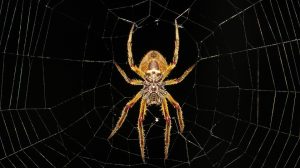Click here to add your own text
SPIDER PEST CONTROL SYDNEY
Spider Pest Control Sydney – Spiders are one of the most feared and disliked creatures worldwide. Australia is home to some of the world’s deadliest spiders such as the funnel-web and red back spider.
However it must be stated that not all spiders are dangerous and some are actually beneficial to the environment.
Spiders can be divided into two main groups:
- Crawling or Hunting spider
- webbing Spiders
The most common spiders that are found in your home are usually due to the fact the spider has spun webs over lamps, curtains, railings, around windows and gutters.
HUNTSMAN SPIDER
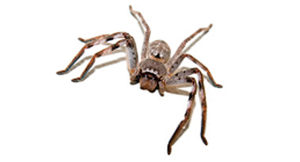
The Huntsman spider belongs to the Family Sparassidae. Huntsman spiders are known as being the “hairy tarantulas”. They are often seen inside your home on the walls or from coming out from behind curtains.
Appearance
- Come in a variety of colours and patterns. They are mostly brown, black and grey.
- The body length of the male is 1.6cm and the female has a body length of 2cm
- Their legs can span up to 15cm
- The back legs are shorter than the front legs
- Their legs span out sideways allowing them to walk both forward and sideways
Habitat
- Can be found on tree trunks, under stones, under bark, on the windows and walls inside your home.
- Can also enter cars & run across the dashboards
- Can live between hairline cracks, sandstone and granite outcrops
- Feeds on a variety of insects, small lizards and frogs
- Stalks and run down its prey
- Poisonous to humans but not fatal
BLACK HOUSE SPIDER
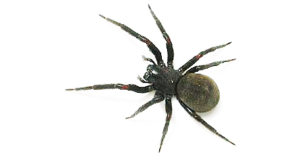
The Black house spider can be found throughout Australia. They are usually found on rough-barked trees and when they come inside they are often found in corners, around windows and doorways and any other light source that can attract prey.
Appearance
- 1-1.5cm in body length and a 3cm leg span
- The female is larger than the male
- The dorsal and legs are dark brown to black in colour while the abdomen is charcoal grey with white markings.
- Their webbings are often mistaken for funnel web spiders as the black house spider constructs funnel looking webs
Habitat
- The web of the black house spider is an untidy, lacy sheet with a funnel like entrance
- Their webs can be found on tree trunks, logs, rock walls, buildings, window frames and crevices.
- In built up areas webs can be found in dark corners of windows, veranda’s, sheds or fences.
- The female never leaves her web unless she is forced to.
BROWN HOUSE SPIDER
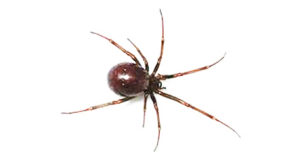
The brown house spider is sometimes mistaken for the red back spider as it has a similar body shape and webbing. It can often be found in dark places inside your home. External sheds, under empty plant pots or among general rubbish.
Appearance
- The female are up to 1.2cm and the male being slightly smaller
- Mottled cream to brown in colour
- The legs are reddish brown and are shiny and thin
- Legs can span up to 25mm
- Spider but does not inflict a dangerous bite.
- Web may include a curled leaf as a retreat for the spider.
Habitat
- Builds untidy, tangled webs
- Webs can be found on walls, under eaves, around garage doors and among leaves on trees and shrubs.
- Undisturbed dark areas are ideal for this spider
- In a cupboard signs of a brown house spider could be white specs of spider droppings
TRAPDOOR SPIDER
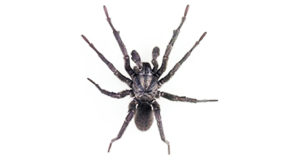
Appearance
- Medium to large spider
- female larger than the male
- Female size 35mm and the male is 20mm in length
- The female has a stocky build
- Short, blunt spinnerets
- There are often pale bars across the abdomen
- Dull brown to black in colour
- Males have boxing glove shaped palps at the front of the head
- Hairs cover the body and legs
Habitat
- Spends most of the time in their burrows
- They wait for food by the front of their burrows
- Burrows are lined with silk
- The burrow can be as long as 25cm and approx 25mm in width
- Silk trip lines radiate from the burrow entrance
- Burrows are used for protection and raising young
- The burrow is made wider and longer as the spider grows
THE FUNNEL WEB SPIDER
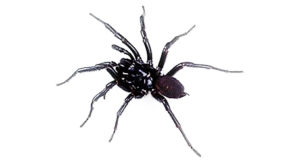
The Sydney Funnel-web Spider is one of the deadliest spiders in the world. When the funnel web is threatened it raises its front legs high off the ground and point its fangs forward ready to strike. When it strikes it drives its fangs down with force and speed.
Appearance
- The cephalothorax is hairless and appears smooth and glossy black
- Black, brown or purplish abdomen
- Body and legs are covered with fine hairs
- The male has more slender legs
- The male has a spur on the 3rd part of the 2nd leg
- The male is 20mm in length
- The Female is 30mm in length
Habitat
- Prefer forested areas
- Private gardens
- They build silk-lined burrow under a rock or log
- The burrow can be up to 60cm long
- The burrow has 2 entrances
- The burrow entrance has thicker lines of silk radiating from the entrance to form trip-lines
- They are attracted to water
- Can be found in your swimming pool
MOUSE SPIDER
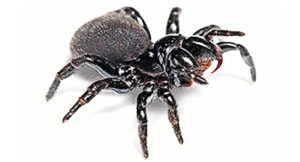
There are 11 known species of mouse spider in Australia and they are related to the trapdoor and the Sydney funnel web spider. Mouse spiders should be considered dangerous and treated with caution as they can be aggressive and will bite if provoked.
Appearance
- Dark brown or black in colour
- medium to large spiders located at the rear of the abdomen
- Their size varies between 10-35mm with the male being smaller than the female
- High, bulbous heads and jaws
- The carapace is smooth and shiny
- The eyes are spread across the front of the carapace
- The spinnerets are short, the last segment domed and button-like
- Male spiders have long slender pedipalps
- Male spiders have no mating spurs on the legs
- Males of some species have distinctive colour markings but others are black overall
Habitat
- Can be found in both coastal and drier habitats throughout Australia
- Live in burrows in soil covered with a hinged top
- Large, silk-lined burrows can vary from 20 cm to 55 cm deep
- They create two surface trapdoors, at right angles to each other
- Difficult to see as the silk and soil trapdoors merge well with the soil
- Heavy rain often forces them out of their burrows
RED BACK SPIDER
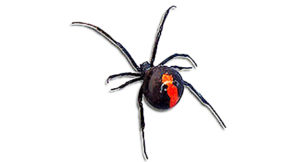
The red back spider can be found across all parts of Australia and will live anywhere there is adequate food, a sheltered area for its web and is warm enough for breeding. The Red back Spider is easily recognised by its black body with a prominent red hourglass shape on its abdomen.
Red back spiders are one of the most dangerous species of spiders in Australia!
Appearance
- The female is about 1cm in length
- The male can range from 3-4mm in length
- The female red-back is black (sometimes brown) with a distinctive red or orange marking on its back
- Markings may be broken into spots in front
- White lines may be visible
- The female can grow up to 15mm long.
- Males are very small and usually only grow up to 5mm long
- The male has more complex markings than those of the female
- White and yellow markings May also be seen on the male
Habitat
- Can be found in logs or under rocks
- They tend to reside in dark, dry areas.
- They can also be seen in roof eaves floorboards, toilets, shelves, flower pots, garages or sheds
- Their web is a triangle shape of dry silk
- Trap lines are sticky which assist in catching prey
- Red back spiders are carnivorous eating almost any small insects that are caught in their webs.
- They are known to also eat skinks and even juvenile mice, snakes and frogs
- The red back spider rarely leaves its web
ST ANDREWS CROSS SPIDER
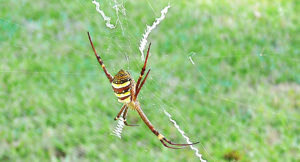
The St Andrews cross spider can be found all across Australia and is named because of the silky bluish white cross pattern it creates on its web, similar to that of the St Andrews Cross on the flag of Scotland.
Appearance
- The Female is 10 – 16 mm in body length
- The male is 3-4mm in body length
- Females abdomen is banded silver, yellow, red and black with 2 yellow stripes below
- Sits with its legs in pairs
- The males are brown and cream coloured
- The web is a medium-sized orb
- The spiderlings are cream-coloured
Habitat
- Can be found on Low shrubby vegetation both during the day and night
- Suburban gardens
- Rainforest margins
- Males build smaller webs close to the female
WHITE TAIL SPIDER
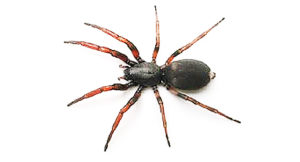
White-tailed Spiders can be found all over Australia and its bites cause severe skin ulceration in humans. White-tailed spiders hunt their prey instead of waiting to catch it in a web. Their preferred diet is other spiders
Appearance
- Medium sized spider
- Male body length is 12mm
- Female body length is 20mm
- Long cigar-shaped dark grey abdomen
- The abdomen is grey and has two pairs of faint white spots
- A distinct white or cream spot can be seen at the tip of the abdomen just above the spinnerets.
- The legs are brown or reddish brown in colour.
- They are slow moving spiders
- They travel great distances looking for prey
- Mostly active at night.
Habitat
- Cool dark areas
- They often come into houses
- They are sometimes found in the folds of clothes, towels and shoes.
- They live beneath bark and rocks
- In leaf litter
- Logs
- Detritus in bush
- Gardens
- Houses
SPIDER IDENTIFICATION CHART
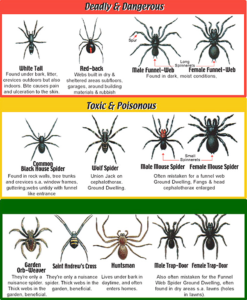
Spider Treatment, Preparation and Expectations
As each and every property & location is different, a pest control management solution should be designed based on your needs
Please give us a call now on 1300 296 964 or get in contact with us via the contact form
Protect the ones you love with PNP Pest Control, our staff are standing by to assist you.
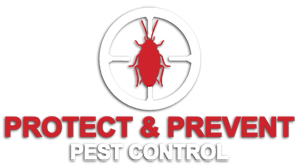
QUALITY PEST CONTROL TREATMENTS AT AN AFFORDABLE PRICE
